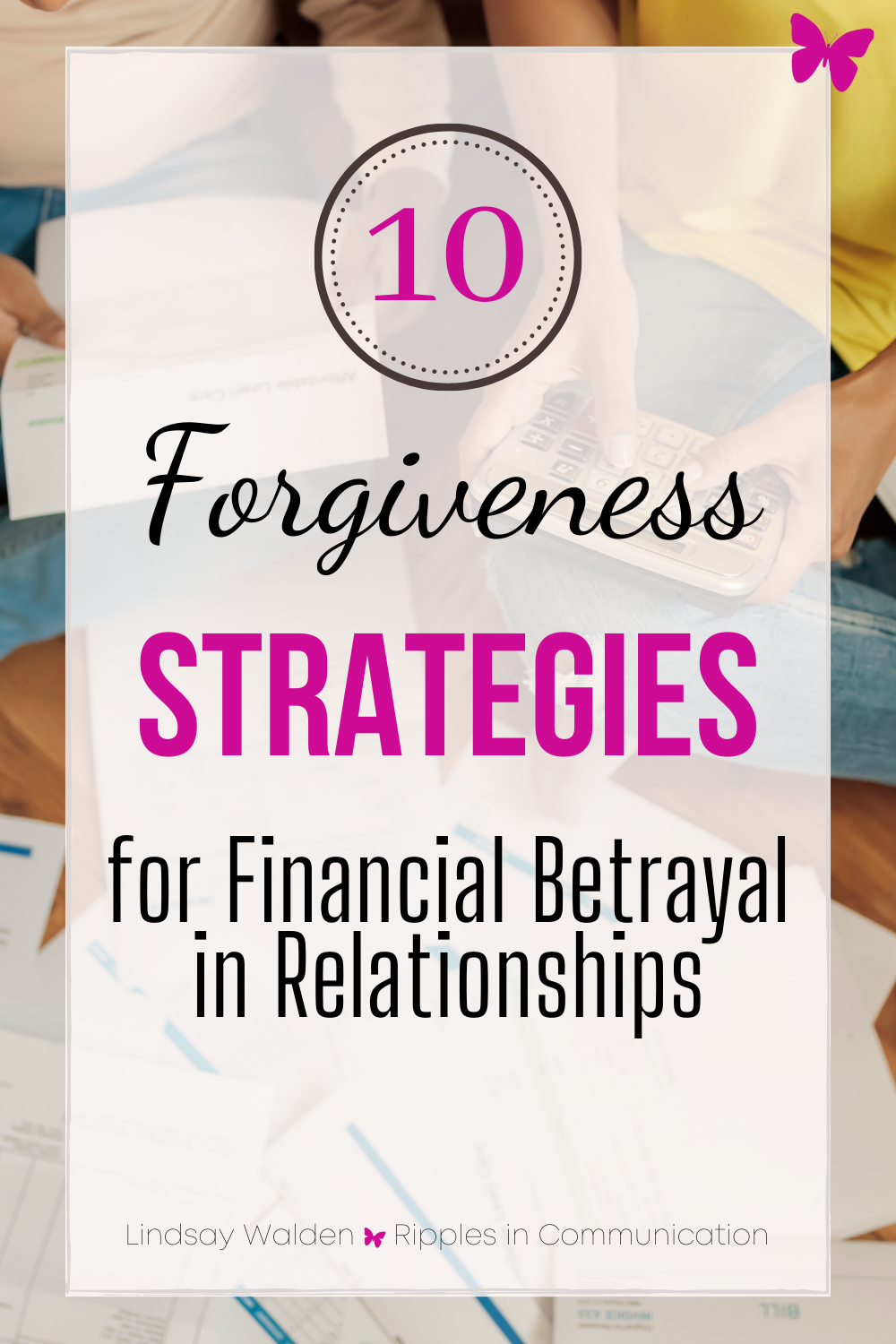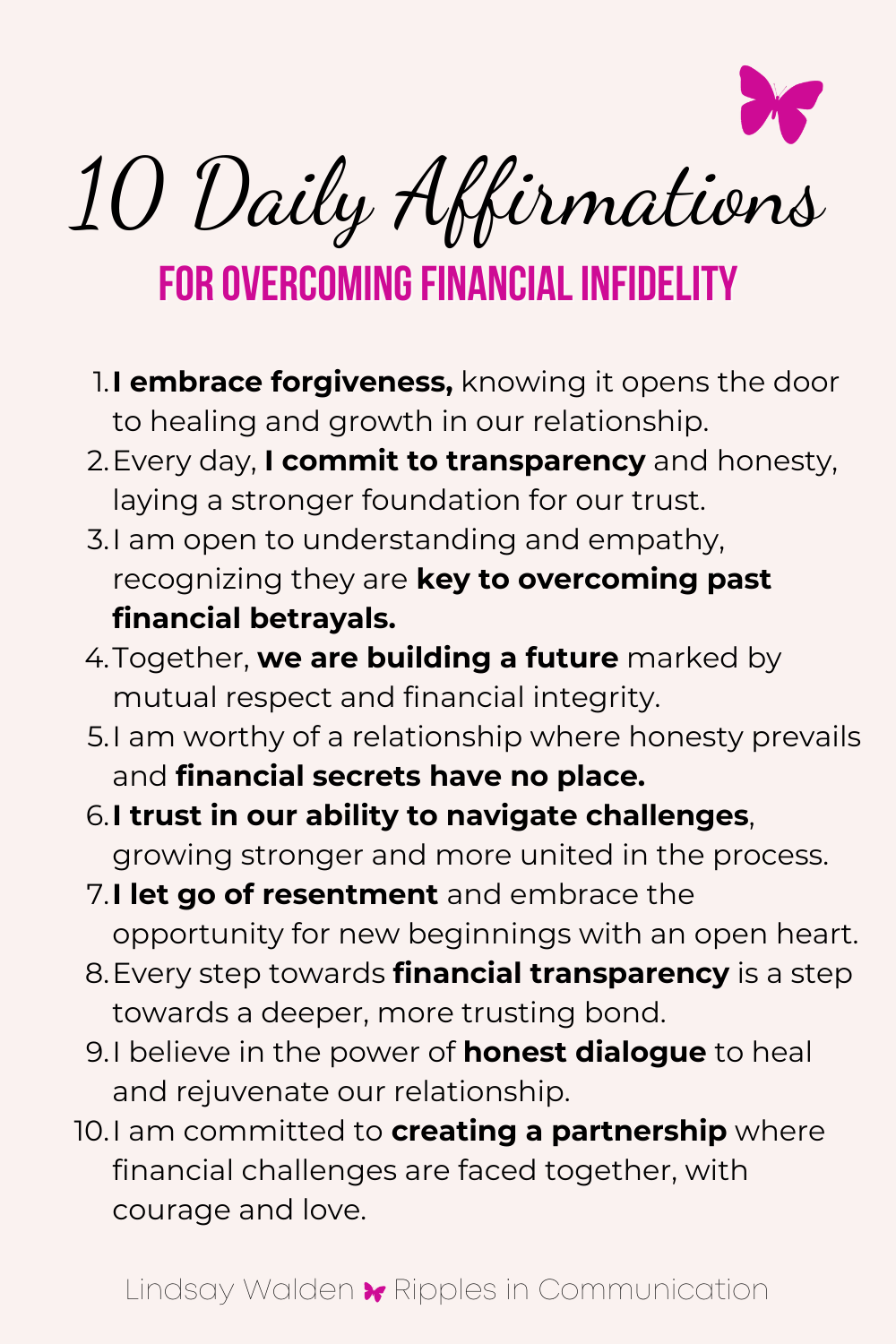Rebuilding Trust After Financial Infidelity: a New Chapter
Discovering hidden credit card debt and dealing with what's called financial infidelity in a relationship can feel like a betrayal, shaking the foundation of trust and intimacy that relationships are built upon. The revelation of such secrets can lead to feelings of anger, hurt, and confusion, and the road to rebuilding that trust can seem daunting. However, it's important to remember that while the situation is challenging, it is not insurmountable. The journey to overcoming this obstacle begins with bringing these issues to light and engaging in open, honest, and direct conversations.
The Power of Transparency
One of my neuroscience mentors often says, "We can't deal with anything that is not brought into the light." This wisdom is particularly relevant when it comes to the hidden aspects of our lives, including financial secrets. Transparency is crucial in a relationship, especially concerning matters that impact both partners. Although the discovery of hidden debt can be painful, it's a crucial step towards addressing the underlying issues and healing together.
Understanding the Root Cause of Financial Infidelity
Secrets, particularly those involving finances, can cause significant harm in a relationship. It's possible that the secrecy stemmed from a place of shame or fear of judgment. Understanding the motivations behind the hidden debt is a critical step towards healing. Developing a "same team mentality" is essential in navigating this challenge. This approach fosters a supportive environment where both partners work together towards common goals, rather than viewing each other as adversaries.
Developing a "Same Team Mentality"
Creating a "same team mentality" involves recognizing that you and your partner are on the same side, facing challenges together rather than blaming one another. This mentality is foundational in building trust and fostering a sense of security within the relationship. It encourages both partners to share their thoughts, feelings, and fears without judgment, creating a stronger, more resilient bond.
Discover how to rebuild trust in your relationship after the shock of hidden debt.
The Importance of Communication and Budgeting
Open communication about finances is vital in any relationship. Sitting down together to create a budget can help both partners understand the financial situation, set goals, and establish a plan to achieve them. This process not only addresses the immediate issue of debt but also strengthens the relationship by encouraging teamwork and mutual responsibility.
The Role of Family History in Financial Habits
Our attitudes and behaviors towards money are often shaped by our experiences during childhood. Discussing how finances were handled in each partner's family of origin can provide valuable insights into current financial behaviors and attitudes. Understanding these influences can help couples address and heal from these "wounds," reducing the likelihood of similar issues arising in the future.
Courageous Conversations: The Path Forward
The discovery of hidden debt is an opportunity to engage in courageous conversations about the things that truly matter in your relationship. These discussions can be challenging, but they are essential for healing and growth. For those unsure where to start, I recommend seeking resources that can guide you in having these meaningful conversations. My relationship communication guide, for example, offers practical advice and strategies for addressing difficult topics in a constructive, empathetic manner.
It's crucial to recognize that the issue at hand is not solely about money but what it represents. Money is a tool that can be used to achieve security, fulfill needs, and pursue desires. However, it can also become a source of stress, control, and conflict. Addressing the emotional and relational aspects of financial issues is just as important as solving the financial problems themselves.
Rebuilding trust after the discovery of hidden debt takes time, patience, and effort from both partners. It involves consistent, open communication, a commitment to transparency, and the willingness to work through challenges together. Forgiveness, understanding, and empathy are key components of this process. By addressing the issue head-on, couples can emerge stronger, with a deeper understanding of each other and a renewed commitment to their relationship.
Navigate through the challenge of forgiving financial betrayal with techniques I use with my clients. Learn how forgiveness can pave the way for a deeper, more trusting relationship.
How to Forgive Your Partner for Hiding Spending and Racking Up Debt
Forgiveness in the context of financial betrayal in relationships is both complex and deeply personal, requiring a careful balance of empathy, understanding, and commitment to healing. Financial betrayal, such as the discovery of hidden debt, can erode trust and create significant emotional turmoil. However, forgiveness can be a powerful step towards rebuilding that trust and strengthening the relationship. Here are several forgiveness techniques tailored for addressing financial betrayal in relationships:
10 Strategies for Forgiveness for Financial Infidelity
1. Acknowledge Your Feelings
The first step towards forgiveness is acknowledging and accepting your feelings of hurt, betrayal, and anger. It's important to give yourself permission to feel these emotions without judgment. This process can involve journaling, meditation, or speaking with a trusted friend or therapist. Recognizing your feelings is crucial for healing and moving forward.
2. Communicate Openly and Honestly
Open and honest communication is essential for understanding the situation and the motivations behind the financial secrecy. Initiating a calm and non-confrontational conversation can provide both partners with a deeper understanding of the underlying issues. This dialogue should focus on expressing feelings without blame and exploring the reasons behind the financial betrayal.
3. Seek to Understand the Other's Perspective
Try to understand your partner's perspective and the factors that led them to hide their financial situation. This step doesn't excuse the behavior but can provide valuable insights into their fears, insecurities, or misunderstandings about money. Empathy plays a crucial role in forgiveness, as it helps to see the situation from your partner's viewpoint.
4. Establish Boundaries and Accountability
Forgiveness does not mean ignoring the betrayal or pretending it didn't happen. It's essential to establish clear boundaries and expectations moving forward. This may involve creating a transparent financial plan, setting up regular check-ins about finances, or seeking the help of a financial advisor. Accountability ensures that both partners are committed to rebuilding trust and preventing future betrayals.
5. Engage in Joint Financial Planning
Working together on a financial plan can reinforce teamwork and rebuild trust. This plan should include setting mutual goals, budgeting, and strategies for debt repayment. Engaging in financial planning together can help both partners feel more connected and responsible for the financial health of the relationship.
6. Practice Self-care and Seek Support
Forgiving financial betrayal can be emotionally draining. Practicing self-care is crucial during this time. This might include engaging in activities that you enjoy, seeking support from friends or family, or consider private therapy to help you work through what you are processing. Private and couples therapy can provide a space to process feelings and learn healthy coping mechanisms.
7. Focus on Rebuilding Trust Gradually
Rebuilding trust is a process that takes time and consistent effort from both partners. Celebrate small victories and progress towards transparency and financial health. Trust is rebuilt through repeated, reliable actions over time, not overnight.
8. Decide What Forgiveness Means to You
Forgiveness means different things to different people. It might mean letting go of anger and resentment for your peace of mind, or it might mean working to rebuild the relationship. Clarify what forgiveness means to you personally and what it looks like in the context of your relationship.
9. Reflect on Personal and Shared Growth
Consider how both you and your partner can grow from this experience. Challenges often present opportunities for personal development and can strengthen relationships if navigated thoughtfully. Reflect on what you've learned about communication, financial management, and empathy.
10. Remember Forgiveness is a Choice and a Process
Finally, remember that forgiveness is a choice you make for your well-being and the health of your relationship. It's also a process that can involve setbacks and challenges. Be patient with yourself and your partner as you work through these steps.
Forgiveness after financial betrayal is challenging but not impossible. It requires a commitment to understanding, communication, and healing from both partners. By employing these forgiveness techniques, couples can work towards healing the wounds caused by financial betrayal and building a stronger, more transparent relationship.
Conclusion
Discovering hidden debt in a relationship is undoubtedly difficult, but it is not an insurmountable obstacle. By bringing these issues into the light, engaging in open and honest communication, and working together towards common goals, couples can overcome the challenges posed by financial secrecy. Remember, the path to healing and rebuilding trust is a journey that you and your partner can embark on together, armed with courage, understanding, and love. You are not alone in this journey, and with the right approach, you can navigate through this storm and emerge stronger on the other side.
Navigate the path to healing and trust in your relationship with these empowering daily affirmations. Perfect for those overcoming financial infidelity, each affirmation is a step towards a stronger, more transparent bond.







